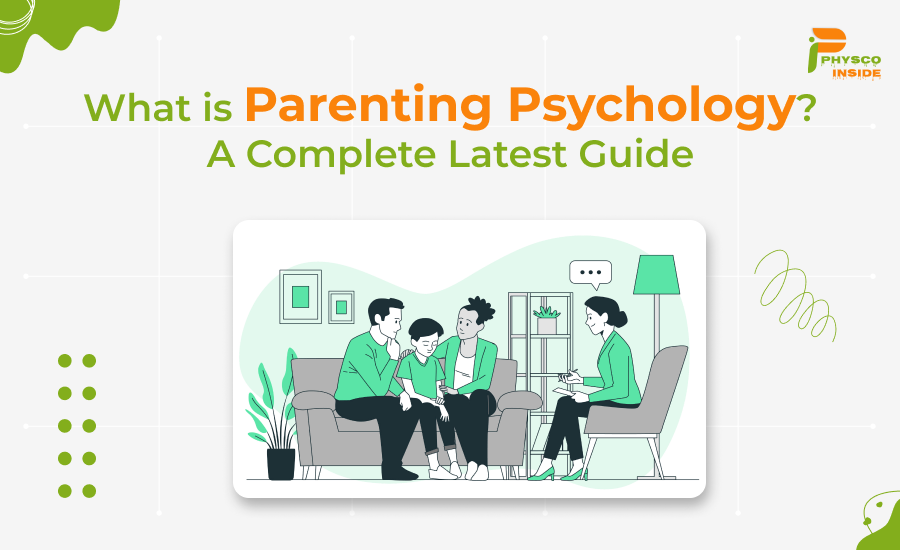(1) Introduction:
Parenting Psychology Explores the complex effective action between parents and children. Exploring the Psychological Principles that shape their relationships and influence child development. It Examines various Parenting styles, Attachment theory, Discipline methods, and the effect of Parental behavior on a child’s emotional, Psychological, and social development. I am writing this article. This article will give you In-Depth knowledge in depth about their importance, Parenting styles, and Developmental perspectives. Understanding Parenting Psychology promotes healthy Parent-Child relationships. Also promotes positive Outcomes for children. Provide parents with effective tools to cross the Complexities of raising and supporting their children.
(2) What is Parenting Psychology?
Definition:
“Parenting Psychology is a type of Psychology in which how Parent’s actions, feelings and thoughts affect their children. It may affect their mental and physical health conditions”.
The field of Parenting Psychology focuses on the Psychological aspects of Parenting. These aspects include the behaviors, points of view, and methods of parents in raising and supporting their children. It Explores how these factors impact child development, behavior, and overall health.
(3) What is the Importance of Understanding Parenting Psychology?
Understanding the research on Parenting Psychology is crucial due to several factors:
3.1) Effective Parenting:
Effective Parenting refers to a Parenting approach that promotes positive Outcomes, Prosperity, and strong relationships between parents and children. It Involves Providing love, support, Guidance, and appropriate Discipline according to the child’s age and individual needs. Effective parents are involved in their Children’s lives and communicate openly and Respectfully. Also, set clear Boundaries and promote Independence and Self-Respect. It provides parents with knowledge and skills to raise their children. It Encourages positive relationships and promotes healthy development.
3.2) Child health:
Child health in Parenting Psychology includes various aspects of a child’s physical, personal, and mental health. It Involves Ensuring that children receive Adequate Nutrition, medical care, and Opportunities to support mental health. Understanding Parenting Psychology ensures that children receive the support, Guidance, and support they need for optimal emotional, cognitive, and social growth.
3.3) Family Dynamics:
Family dynamics in Parenting Psychology refer to the patterns of Interactions, relationships, and communication within a family unit. It involves understanding how family members relate to one another, resolve conflicts, and fulfill roles and Responsibilities. Understanding Parenting Psychology helps to improve communication, Reuniting, and overall harmony within the central family.
(3.4) Prevention and Intervention:
Prevention in Parenting Psychology includes measures to expect and address family issues.
while Intervention Resolves Existing issues through professional help and resources, Promoting healthy relationship dynamics and health. It helps in Identifying and Addressing issues such as child behavior problems, Parental stress, and family Dysfunction. These issues lead to early Intervention and Prevention of more serious problems.
(3.5) Educational and Community Support:
Educational community support for Parenting Psychology includes programs, resources, and Creativity. It provides Guidance, information, and assistance to parents and families, Encouraging healthy development and relationships. Knowledge of Parenting Psychology informs the development of effective Parenting education programs and community support, Benefiting families and society.
(4) What are the Key Concepts of Parenting Psychology?
Key ideas in Parenting Psychology are as follows:
4.1) Parent-Child Attachment:
The personal connection between a parent or guardian and their child influences the child’s sense of security, study, and relationships throughout life.
4.2) Parenting Styles:
Different patterns of Parenting behavior reflect different degrees of control and warmth. Popular styles include Dependable, Authoritarian, free, and Uninvolved.
4.3) Parenting Practices and Processes:
Specific actions and procedures used by parents to meet the physical, personal, and Developmental needs of their children. This includes Discipline methods, Technical techniques, and Educational Approaches.
4.4) Parental Effect on Child Development:
Parents shape their Children’s mental, personal, social, and Behavioral development. Through their Interactions, Modeling, and Supplying of resources.
4.5) Parental Role Identity:
The Psychological Construct Involves Individuals’ Perceptions, beliefs, and Behaviors Associated with their Role as a Parent, which affects Parenting Practices and Pleasure.
4.6) Parental Efficacy:
The belief in one’s ability to effectively fulfill the Responsibilities of Parenting. Impacts on Parental behaviors, coping Strategies, and overall Well-Being.
4.7) Parent-Child Dynamics:
The mutual relationship between parents and their children is Specified by communication patterns. Power dynamics and deep exchanges influence family Interactions and Functioning.
4.8) Parental Monitoring and Supervision:
Parents must be aware of and involved in their Children’s activities and relationships. Parental behaviors affect Outcomes such as Academic achievement, Substance use, and Misbehavior.
4.9) Parenting Goals and Values:
The Principles, Priorities, and Expectations that guide parents’ decisions and actions in raising their children. Also reflect Cultural norms, personal beliefs, and Societal Expectations.
4.10) Parenting Stress and Coping:
The challenges and strains experienced by parents in Fulfilling their Caregiving roles. Use of plan and resources to manage Stressors and maintain Well-being for themselves and their families.

(5) What are Developmental Theories of Parenting Psychology?
Developmental Theories in Parenting psychology are structures that explain how children grow, develop, and progress. These Theories give us the context of their relationships with Caregivers.
Some significant Developmental Theories in Parenting Psychology include:
5.1) Attachment Theory:
Developed by John Bowlby and Expanded by Mary Ainsworth, Attachment theory focuses on the personal bond between children and their Caregivers. It describes how secure Attachments formed during infancy Contribute to Children’s overall health. Social Competence, and ability to form healthy relationships later in life.
5.2) Social Learning Theory:
Proposed by Albert Bandura, Social Learning Theory Highlights the role of Observation, copying, and Reinforcement in Children’s Learning and Behavior. It suggests that children learn by Modeling. The behaviors of their parents or other significant adults, as well as through the effect (rewards or punishments) of their actions.
5.3) Cognitive Development Theory:
Pioneered by Jean Piaget and further developed by Lev Vygotsky. Cognitive Development Theory Explores how children acquire knowledge, solve problems, and make sense of their world. It highlights the role of parents in Supporting Children’s Cognitive growth through Scaffolding, guided Interaction, and Providing proper learning Opportunities.
5.4) Ecological Systems Theory:
Urie Bronfenbrenner Proposed the Ecological systems theory. This theory highlights the importance of considering multiple layers of influence on child development. Vary from close family relationships to broader social, Cultural, and Environmental Contexts. It Highlights the Interconnectedness of different systems in shaping Parenting practices and child Outcomes.
These Developmental Theories provide valuable Insights into the Complexities of Parent-child Interactions. These help Researchers, Educators, and parents themselves better understand how to support Children’s growth and development across different stages of life.
6) What are the main Features of the Parent-child relationship?
The Parent-Child relationship is based on certain Fundamental elements which are as follows:
- Connection: A strong personal bond between parent and child creates a sense of security and trust.
- Communication: Open, honest, and Respectful communication between parent and child that Involves both verbal and Non-Verbal cues.
- Support and Guidance: Parents offer support, Guidance, and direction to help their children cross challenges and achieve their full potential.
- Limits and Independence: Parents set proper limits while Encouraging their child’s Independence and critical thinking skills.
- Nurturance and Friendship: Expressions of love, warmth, and physical love Contribute to a positive and Nurturing environment.
- Role Modeling: Parents act as role models, shaping their children’s attitudes, behaviors, and values through their own choices and Interactions.
- Trust and Reliability: Trust and Reliability in Meeting the Child’s Needs and Responsibilities Encourage trust and deep security. All these Features Collectively Contribute to the development of a strong, stable, and Mutually rewarding parent-child relationship.

7) What are the major Styles of Parenting Psychology?
There are four significant styles of Nurturing brain science, which are described as follows:
7.1) Authoritative Parenting:
This style is identified by degrees of comfort and Responsiveness. Coupled with clear and expected quality and Expectations. The parents Encourage Independence while also Providing Guidance and support. Communication is open, and Discipline is Productive instead of Corrective.
7.2) Authoritarian Parenting:
This style is marked by degrees of comfort and order, often with little comfort or Responsiveness. The parents Highlight Obedience and Adjustment to rules without much explanation or discussion. Discipline tends to be severe, and communication is Typically one-way.
7.3) Permissive Parenting:
This style is Specified by degrees of comfort and Responsiveness. However, this style has low levels of control and order. The parents are Tolerant and liberal. Allowing children significant freedom with few rules or Expectations. Discipline is Unstable or Non-Existent, and communication might lack structure or limits.
7.4) Uninvolved Parenting:
This style includes low levels of both Comfort/responsiveness and Control/Order. – The parents are Emotionally removed and distant from their children’s lives, providing minimal guidance or support. Communication is limited, and there is little Involvement in the child’s activities or interests.
These Parenting styles can significantly impact Children’s development and Well-being, influencing aspects such as self-esteem, academic achievement, social skills, and personal Regulation.
8) Which Factors Influence Parenting Psychology?
Several factors have an impact on how parents nurture their child’s brain development. These factors include:
- 8.1) Child’s Personality: Every child has a unique personality. This can influence how parents Interact with them and their parenting style.
- 8.2) Developmental Stage: The age and developmental stage of the child can impact parenting techniques. The needs and abilities of children change over time.
- 8.3) Parental Beliefs and Values: Parents’ own beliefs, values, and cultural background shape their parenting style and decisions.
- 8.4) Parental Stress and Wellness: Parents’ levels of stress, mental health, and overall health can affect their parenting behaviors and interactions with their children.
- 8.5) Financial Status: Financial factors, such as income level and access to resources, can impact parenting practices. Also impacts the potential opportunities available to children.
- 8.6) Family Structure and Dynamics: The structure of the family (e.g., single-parent, nuclear, extended) and relational dynamics (e.g., conflict, attachment) can influence parenting dynamics and relationships within the family.
- 8.7) Social Support: The availability of social support systems, including family, friends, and community resources, can impact parenting processes and parental well-being.
- 8.8) Cultural Influences: Social norms, values, and traditions play a significant role. Culture impacts shaping parenting practices and expectations about child-parent.
- 8.9) Child’s Needs and Qualities: The individual needs, abilities, and characteristics of the child. Such as temperament, personality, and any special needs or challenges, can impact parenting approaches.
- 8.10) Parenting Goals and Expectations: Parents’ goals and expectations for their child’s development, success, and well-being can influence their parenting behaviors and decisions.
These factors are interconnected and can influence parenting psychology in complex ways, affecting the parent-child relationship and child outcomes.
9) What is the Impact of Parenting Psychology on Child Development?
Nurturing is an essential factor that significantly impacts a child’s development across various areas.
9.1) Personal Development:
Showing comfort, responsiveness, and building a secure connection with the child. That can help a deep sense of security and self-regulation. Parental modeling of coping strategies can help develop deep skills.
9.2) Mental Development:
Parental involvement in interesting activities and stable interactions. They can enhance cognitive abilities and academic achievement. Engaging in problem-solving activities can promote academic interest.
9.3) Social Development:
Positive parent-child relationships help healthy social interactions, empathy, and prosocial behavior. Parental guidance in social relationships can help develop social ability and peer relationships.
9.4) Behavioral Development:
Stable discipline techniques and parental observation promote self-regulation and adaptive behavior. Balancing independence with clear boundaries can encourage responsible independent behavior.
Overall, the quality of parenting significantly impacts a child’s personal, mental, social, and behavioral development, laying the foundation for their future success.
10) What are the main challenges of Parenting Psychology?
- Parenting can be a challenging and Stressful Task.
- It involves maintaining a balance between fun and serious activities, adapting to children’s behavior, and dealing with financial issues.
- Time checks can make it difficult to spend quality time with kids. The feeling of deficiency or making mistakes while parenting can lead to parental guilt.
- The pressure of balancing multiple roles as parents, partners, and employees adds to the stress.
- Comparing oneself with others’ parenting styles or children’s achievements can also contribute to the burden.
- Additionally, dealing with life changes and addressing special needs further complicates the challenges of being a parent.
11) What are the best Interventions for Parenting psychology?
Parenting interventions and support services offer valuable resources for caregivers:
11.1) Parenting Education Programs:
These programs provide valuable guidance and plans for effective parenting. Covering topics such as child development, discipline techniques, and communication skills.
11.2) Counseling and Therapy:
Professional counseling and therapy services offer individualized support. Parents deal with challenges such as stress, relationship issues, or mental health concerns.
11.3) Support Groups for Parents:
Support groups bring together parents facing similar challenges. Offering a sense of community, shared experiences, and practical advice in a supportive environment.
11.4) Online Resources and Helplines:
Online platforms and helplines provide easily accessible information. Resources, and support for parents, including articles, forums, and virtual counseling services.
These interventions and support services play an important role in helping parents. These complexities of parenthood promote positive parent-child relationships.
12) How is Parenting psychology Linked to a child’s mental health?
Parenting Psychology positively impacts a child’s mental health. Through secure attachment, sincere guidance, effective communication, discipline, stress reduction, and positive self-esteem. Providing nurturing, stable, and authoritative parenting leads to better emotional health outcomes in children.
13) Conclusions:
Parenting psychology sheds light on the various aspects of relationships between parents and children. It highlights the significant impact of parenting styles, practices, and connections on a child’s development and mental health. By promoting secure attachment, personal guidance, effective communication, and positive self-esteem, Guardian psychology. Establishes the foundation for healthy parent-child relationships and leading mental health. Understanding these principles provides parents with valuable insights. The plans to parent strong, blooming children ultimately shape the future generation’s personal and mental views.
Frequently Asked Questions (FAQS)
Parenting psychology focuses on how parents’ behaviors, beliefs, and interactions with their children influence child development and health.
The main parenting styles are authoritative, authoritarian, permissive, and uninvolved, each specified by different levels of comfort and control.
Parenting styles significantly impact children’s personal, psychological, and social development, with authoritative parenting typically leading to the best outcomes.
Common parenting challenges include managing a balance between fun and educational activities. Addressing children’s behavior issues, coping with financial pressures, and technology.
Parents can support their child’s mental health by providing emotional support. Promoting open communication, encouraging a strong attachment, and seeking professional help when needed.
Parental involvement, including engaging in activities with children, providing guidance, and offering daily encouragement. Also plays a significant role in promoting healthy child development and academic achievement.
Effective discipline plans include setting clear expectations, being stable with consequences, using positive reinforcement, and modeling desired behaviors.


